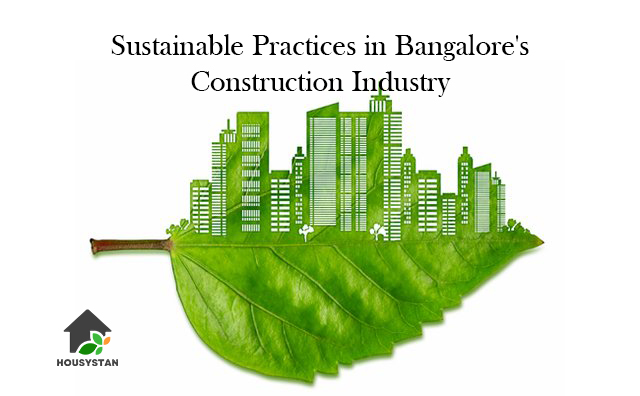Sustainable Practices in Bangalore's Construction Industry: Building a Greener Future
Read latest blogs and articles from Housystan

The Information mentioned here was last updated on:
21/2/2026Sustainable Practices in Bangalore's Construction Industry: Building a Greener Future
Introduction: The Green Revolution in Bangalore’s Construction Sector
Bangalore, often referred to as India’s Silicon Valley, is rapidly transforming its urban landscape. With the city’s population swelling and its skyline reaching new heights, the construction industry stands at the forefront of this evolution. However, the sector’s growth brings with it significant environmental challenges—ranging from resource depletion to air pollution and waste generation. In response, a green revolution is underway in Bangalore’s construction industry, marked by the adoption of sustainable practices aimed at building a more eco-friendly and resilient future.
- Verified Tenants/Buyers
- Unlimited Property Listing
- Zero subscription/charges fee
Understanding Sustainability in Construction
Sustainability in construction goes beyond simply using eco-friendly materials. It encompasses a holistic approach that seeks to minimize the environmental footprint of a building throughout its lifecycle—from design and construction to operation and eventual demolition. Sustainable construction practices focus on energy efficiency, water conservation, waste reduction, and the use of renewable resources.
The Need for Sustainable Construction in Bangalore
Bangalore’s rapid urbanization has intensified the demand for housing, office spaces, and infrastructure. However, this growth comes at a cost: the city’s green cover has shrunk, water bodies are under strain, and construction waste is piling up. These challenges have prompted policymakers, builders, and residents alike to seek greener alternatives. Sustainable construction practices are now viewed not just as an ethical choice, but as an economic necessity for ensuring the city’s long-term livability.
Adoption of Green Building Certifications
Bangalore is witnessing a surge in buildings certified by green rating systems such as IGBC (Indian Green Building Council), LEED (Leadership in Energy and Environmental Design), and GRIHA (Green Rating for Integrated Habitat Assessment). These certifications encourage developers to incorporate energy-efficient lighting, water-saving fixtures, sustainable building materials, and renewable energy sources into their designs. As a result, many commercial and residential projects in Bangalore are being constructed with an eye toward global sustainability standards.
Innovative Building Materials and Techniques
One of the hallmarks of sustainable construction in Bangalore is the use of alternative building materials. Fly ash bricks, autoclaved aerated concrete blocks, and recycled steel are replacing traditional bricks and cement, reducing the carbon footprint of new structures. Additionally, techniques like rainwater harvesting, rooftop solar panels, and green roofing systems are being integrated into new projects to enhance resource efficiency and promote environmental responsibility.
Water Conservation: A Critical Priority
With water scarcity looming as a major concern in Bangalore, construction projects are incorporating water management systems as a standard practice. Rainwater harvesting structures, dual plumbing systems for recycling greywater, and water-efficient landscaping are becoming increasingly common. These measures not only help conserve precious water resources but also reduce the operational costs for building occupants.
Energy Efficiency and Renewable Energy Integration
Energy consumption is a major contributor to greenhouse gas emissions in urban areas. To address this, Bangalore’s builders are investing in energy-efficient appliances, LED lighting, high-performance glazing, and insulation techniques to reduce electricity consumption. The integration of renewable energy sources—particularly solar power—has seen a significant uptick, with several buildings now sporting solar panels that power common areas or even individual units. This shift not only supports the city’s sustainability goals but also offers long-term savings to property owners.
Waste Management and Recycling Initiatives
Construction and demolition waste accounts for a significant portion of Bangalore’s landfill burden. To combat this, the industry is embracing waste segregation, recycling, and the reuse of materials wherever possible. Some developers collaborate with local recycling firms to process construction debris into reusable aggregates or tiles. Such initiatives not only reduce landfill pressure but also encourage a circular economy within the construction sector.
Smart Building Technologies and Automation
The rise of smart technology is revolutionizing Bangalore’s construction landscape. Automation systems that optimize lighting, heating, and cooling based on occupancy levels are becoming standard features in both commercial and residential projects. These intelligent systems reduce energy wastage and create healthier indoor environments. Furthermore, the use of Building Information Modeling (BIM) is enhancing project planning, resource management, and collaboration among stakeholders, ensuring that sustainability remains a priority from blueprint to completion.
Government Policies and Incentives
The Karnataka government and local municipal bodies have introduced a suite of policies to promote green construction. Incentives such as fast-track approvals, property tax rebates, and subsidies for green-certified buildings are motivating developers to embrace sustainable practices. These regulatory frameworks complement the efforts of industry bodies and environmental organizations, creating an ecosystem that supports sustainable urban development.
Community Engagement and Awareness
Ultimately, the success of sustainable construction in Bangalore hinges on community participation. Many developers are actively engaging with residents, educating them about green features and encouraging eco-friendly habits. Resident welfare associations are also stepping up, implementing waste segregation, composting, and water conservation initiatives within their communities. This collective effort is helping to instill a culture of sustainability in the city’s urban fabric.
Challenges and the Road Ahead
While significant strides have been made, Bangalore’s construction industry still faces challenges in fully realizing its sustainability potential. High upfront costs, lack of skilled labor, and limited awareness among smaller builders can slow the adoption of green practices. However, with continued collaboration between government, industry, and citizens, these barriers can be overcome. The city’s growing reputation as a hub for innovation and technology positions it well to lead India’s green building movement.
Conclusion: Shaping a Greener Tomorrow
The construction industry in Bangalore is at a pivotal juncture. By embracing sustainable practices—from green certifications and innovative materials to energy efficiency and community engagement—the city is laying the foundation for a greener, more resilient future. As these efforts gain momentum, Bangalore has the opportunity to serve as a model for sustainable urban development, inspiring other cities across India and beyond to build not just for today, but for generations to come.